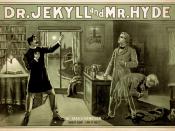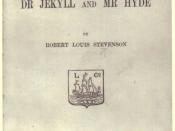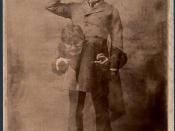" The unconscious is the true psychical reality; in its innermost nature it is a much unknown to us as the reality of the external world, and it is as incompletely presented by the data of consciousness as is the external world by the communication of our sense organs."
--Sigmond Freud (Rieff 32)
In Robert L. Stevenson's novel, The Strange Case of Dr. Jekyll and Mr. Hyde, the reader encounters Dr. Henry Jekyll, a well-known and respected man of London. Like many people, Dr. Jekyll deals with a conscience that is constantly nagging him. Sometimes it wants him to act out, other times it wants him to be presentable and discreet. Jekyll becomes frustrated with the continuous conflicts he finds himself in and contemplates an escape from the part of his mind that is always saying, "No". In Freud's theories of personality there are three elements to the mind: unconscious, preconscious, and conscious.
All work together to create decisions in conjugation with the three basic components of personality: id, ego, and superego. Freud's theories are demonstrated throughout the novel by the situations that occur around Jekyll and Hyde's interactions with each other and the outside world.
The unconscious mind is the part of one's mind that whispers urges. It represents impulsive thoughts, feelings, and urges that reside in the back of the mind. These actions are revealed occasionally through "accidents, mistakes, ...forgetting, and ... slips of the tongue." (Hockenbury 432). Jekyll is very much in touch with his unconscious and the things that come with that torment him because he thinks that he is acting shamefully when he follows through with what his unconscious tells him. These instances motivate Jekyll to conjure up a way for him to act out on these inhibitions without feeling guilty afterwards. He...



Good
concise essay that has a clear thesis and a very well thought arguement. Good job!
8 out of 8 people found this comment useful.